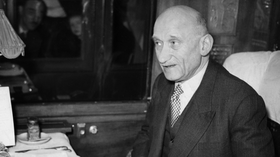Acknowledging Enid Blyton’s racism isn’t ‘cancelling’ her – it’s a reminder that Britain gets the cultural icons it deserves

The Famous Five author’s been reappraised by English Heritage, which claims she was “racist and xenophobic”. Some cry ‘censorship’, but her books and her blue plaque haven’t been removed. This isn’t cancel culture – it’s context.
Not a week goes by these days without some dead white writer or public figure’s reputation being exhumed, then hanged, drawn, quartered and reinterred in a mass cultural grave – all for the crime of being a posthumous racist, sexist or homophobic pig. Recently, the likes of Roald Dahl, Rudyard Kipling, J.R.R. Tolkien, H.G. Wells and countless other great white hypes of English literature have been cancelled, beyond the grave, thanks to the PC CID reinvestigating the dubious characterisations and subtexts woven into some of their most celebrated works.
Even the seemingly benign Charles Dickens – whose most famous novel, ‘A Christmas Carol’, is as joyfully yuletide as Santa, Coca-Cola and falling out with the in-laws – has been smeared as a “misogynist, imperialist anti-Semite”. Sorry, Charlie, but consider yourself cancelled.
That said, laying to rest the ghosts of racist authors past is easier said than done when many of the alleged worst offenders are still among the biggest sellers in publishing history. Take Agatha Christie, for instance. Having banged out 66 detective novels and 14 short-story collections, Dame Agatha has sold more than two billion copies of her work and holds a virtually unbeatable Guinness World Records title for the most books sold by a single author. She also penned the world’s longest-running play, ‘The Mousetrap’, which ran without a break in London’s West End from 1952 to 2020, and would have continued to do so, had Covid not intervened. Her novels have been adapted into countless films, with the public’s enduring love of her detective creations Hercule Poirot and Miss Marple making her a one-woman media institution and national treasure. Nonetheless, she was a racist and an alleged anti-Semite, whose bestselling 1938 whodunnit was originally titled ‘Ten Little N*****s’, having been loosely based on the similar opening words of an American nursery rhyme.
Christie died in 1976, aged 86, so one could dismiss her use of the N-word, as with many of her ilk, with the notion that “it was a different time back then”. Alternatively, one could always press the ‘off’ button, so to speak, and simply choose to ignore or boycott such authors without requiring the Department of Woke to remove them from bookshops, libraries and the general cultural landscape. But yet again, it doesn’t take Sherlock Holmes (yep, he’s been denounced as a racist and misogynist, too) to work out that Christie and others got themselves into hot water over their racist leanings long before political correctness or wokeism became a thing.
The US edition of ‘Ten Little N*****s’ was published in 1940 with the title ‘And Then There Were None’, the last five lines of the aforementioned nursery rhyme, because the N-word was deemed too offensive for the squeamish American market. Some might say such a proto-woke sentiment was rich coming from a country with a long history of slavery and industrial-complex racism, which, at the time, was knee-deep in apartheid-style Jim Crow laws. However, on many levels, Britain was far worse, operating as it did a quasi-fascist colonial system on five continents that oversaw the subjugation of tens of millions of people. Perhaps the long tail of British bigotry explains why ‘Ten Little N*****s’ didn’t have a title change in the UK until 1985 – and, even then, it became ‘Ten Little Indians’. But at least we’re not as bad as the French: they didn’t change the title until last year.
As a writer, I’m no fan of censoring anything beyond that which is illegal. Removing the possibility of me being offended via widespread censorship removes my right to offend – and I like being offensive. I’ll admit that some of my favourite writers, artists and musicians, through a certain lens, are offensive, too; some could be viewed as racist, misogynist or homophobic pigs, to some extent. But human beings, not least “creatives”, are complex and often fraught with cognitive dissonance and other oxymoronic quirks.
In some ways, we’ve reached yet another cultural crossroads, where there’s “good racism”, such as stand-up comedy, rap music or any dog-shit movie directed by Quentin Tarantino, and then there’s “bad racism”, which is basically anything created by white conservatives anywhere on the planet at any time in human history. Good racism gets cut some slack because – hey! – we like Chris Rock and Ricky Gervais. Bad racism, on the other hand, needs to get cancelled because, well, it’s all a bit beige, low-brow and smells of mothballs and stale urine.
So-called cancel culture is, to some extent, about getting rid of things that aren’t cool or that represent boring, old-fashioned, unsophisticated claptrap. In other words, it’s flipping the bird to your parents or grandparents in the time-honoured tradition of youthful rebellion. Or, put another way, being woke is, by turns, the new punk rock and a cultural vacuum cleaner, sucking up English literature’s textual detritus that had been long since swept under the carpet.
While I’m all for kids rebelling, and then, as good punks do, sobering up, getting a sensible haircut and landing a decent well-paid job, it’s the likes of English Heritage wielding the cultural Hoover with its latest revisionist spring-cleaning of Blyton and Kipling that I find rather commendable.
Having acknowledged the “racism, xenophobia and lack of literary merit” in Blyton’s writing, and the “racist and imperialist sentiments” of Kipling, it has decided to update its biographical material on the pair to, as The Guardian put it, “better reflect today’s values in its blue plaques”. The cultural gatekeeper also references on its website a 1966 Guardian article that highlights the racism of Blyton’s ‘The Little Black Doll’. The titular doll, Sambo, is ostracised for its “ugly black face” and only brought into the bosom of white society when it is washed “clean” by the rain.
That Blyton was, and remains, a popular children’s author is troubling, not just because of her dodgy racist views, but because she reinforces racist ideas by perpetuating tired old racial stereotypes and epithets to credulous audiences through monumentally bad writing. “Sambo” characters appeared in ‘Vanity Fair’, ‘Uncle Tom’s Cabin’ and, er, ‘The Story of Little Black Sambo’ decades before she started smashing out half-baked children’s stories in her kitchen.
Blyton is such a dodgy writer that, in 2016, the Royal Mint rejected her as a possible commemorative figure on a 50p coin because, according to minutes from an advisory committee meeting, she was “known to have been a racist, sexist homophobe and [is] not a very well-regarded writer”.
Also on rt.com The UK publication of a history book labeled ‘too white’ has been delayed. ‘Publish and be damned’? That principle is clearly deadEnglish Heritage has, quite rightly, no intention of removing Blyton’s blue plaque or that of Kipling, another popular yet overrated hack, whose ‘The White Man’s Burden’ is singled out by the organisation for “its offensive description of ‘new-caught, sullen peoples, half devil and half child’” that “sought to portray imperialism as a mission of civilisation”.
Since the BLM-inspired toppling of slave-trading philanthropist Edward Colston’s bronze into Bristol Harbour in June last year, there have been growing calls to remove a variety of statues, plaques and other commemorative eyesores, and thus somehow erase the past to accommodate the woke present. But this simply lets historical lightweights off the hook.
While some statues, such as that of the imperialist Cecil Rhodes at Oxford University, could do with literally being made an exhibition of in a museum, like Colston’s has been, the overwhelming majority ought to stay in situ. By retaining Blyton and Kipling’s plaques while exposing their biographical mediocrity to newer generations, English Heritage has done the nation a great service. Not only has it outed another couple of imperialist stooges for all to see, it’s reminded us once again that British society gets the monuments it deserves.
Think your friends would be interested? Share this story!
The statements, views and opinions expressed in this column are solely those of the author and do not necessarily represent those of RT.















